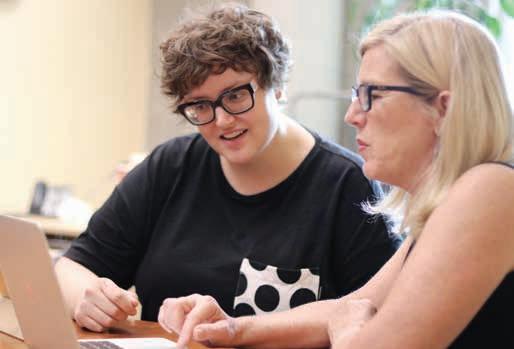
6 minute read
Critical Aging Studies Comes of Age
Five Years of Challenging The Way We Think About Aging
Justin Sutton ’09
Recalling the grassroots creation of the Trent Centre for Aging & Society (TCAS), Dr. Stephen Katz, professor emeritus, remarked, “Some years ago, I realized that Trent has some of the most interesting, productive, and innovative scholars in aging studies and aging research, but they come from different disciplines. Rather than isolating aging to a gerontological program, or sociology, I thought about forming a research group that would invite people from all walks of research and areas and experience to work together, as long as we held a similar critical and interdisciplinary perspective and shared a series of common problems around aging and the life course and old age.”
What happened next went beyond what Professor Katz had ever imagined possible. More than a dozen faculty members responded to his call to collaborate and an informal group coalesced around a shared passion to critically engage with age-related issues. According to Prof. Katz, the Centre was born “out of circumstance and opportunity,” thanks to the commitment and energy of founding director (now acting dean of Social Sciences), Dr. Mark Skinner; current director, Dr. Sally Chivers; as well as several other key scholars, including Dr. Barb Marshall, Sociology.
Professor Marshall’s work in age studies is part of her commitment to scholarship that has a social justice orientation at its heart. She describes this as being “inextricably entwined with my work as a feminist sociologist.” Further, she says, “This is what has provided the overarching framework for my academic career—the commitment to exposing, analyzing and changing social constructions of difference and inequality and their intersections as these are produced and experienced.”
What began as a series of hallway conversations many years ago with Prof. Katz developed into a wideranging program of research and— on aging, sexuality, embodiment, technologies, and even curling! “Collaboration with others, at Trent and elsewhere, including longstanding colleagues like Stephen, and former students like Dr. Kristi Allain (who is now an assistant professor of Sociology at St. Thomas University), as well as newer collaborators like Dr. Linn Sandberg from Södertörn University in Sweden, has been really important in developing these projects,” Prof. Marshall says. “I think research like ours is particularly important in a political climate shaped by austerity to counter the perception that aging populations are a drain on social resources and older people are a risky and problematic bunch.”
Since TCAS became an official research centre just five years ago, its members, who include two Canada research chairs, have attracted more than $2.7 million in funding for projects that cover a broad range of topics and disciplines. One such project, completed in partnership with the Trent Community Research Centre, served to inform Peterborough’s Agefriendly Community Action Plan, which is now part of the city and county’s official plan. Another seven-year, multi-million-dollar project saw Trent scholars, both faculty and students, travel with international colleagues from a wide array of disciplines to six countries in an effort to reimagine long-term residential care by sharing the “promising practices” they uncovered with a broad audience.
Prof. Marshall’s most recent work, Digital Infrastructures of Health and Aging, focuses on the notion that electronic devices enlist their wearers into producing and circulating their own health information and data.
“Tracking the way older people use electronic devices in their daily lives will allow us to contribute meaningfully to ethical debates about participatory surveillance and what that might mean for healthcare management,” says Prof. Marshall. “Importantly, this work also treats older people as a source of innovation.”
Prof. Marshall’s project is one part of a larger million-dollar international study that includes partners in the Netherlands, Spain, and Sweden. Like all members of the Centre, Dr. Marshall is also passionate about training the next generations of scholars. Indeed, part of the mandate of Digital Infrastructures is to collaborate with early stage researchers and offer them the chance to work with, and learn from, more established scholars.
Nicole Dalmer, recent recipient of the Michael F. Harcourt post-doctoral fellowship from AGE-WELL NCE, is one of the project’s post-doctoral fellows. Ms. Dalmer, whose doctoral thesis is currently under review at Western University’s Library and Information Sciences program, focused her graduate work on looking at the ways that information intersects with care, specifically examining the ways that family caregivers use information to guide and support their care work.
“I am excited to be working and learning with Dr. Barb Marshall and look forward to the possibilities and collaborations with members of TCAS and the Department of Sociology,” she says. “I look forward to applying my interests in the ways that people use information and technology in their everyday and every night lives to the international Digital Infrastructures project.”
The growing renown of the Centre’s membership has become an important factor in attracting high caliber international scholars to Trent University. So far, Prof. Marshall has hosted graduate or postgraduate students for short-term visits from Austria, Germany, and Sweden. Others have hosted visitors from Australia, Finland, Ireland, New Zealand, and Spain. TCAS’ unique identity as a Centre that is not just multidisciplinary, but truly interdisciplinary provides a synergy that will continue to make it an important locus for future work on aging. Indeed, researchers associated with the Centre are developing critical intersections with Indigenous studies, sexual diversity studies, social activism and arts-based methodologies. So, too, the recent appointment of Dr. Sally Chivers as director will almost certainly see the Centre working to ally age studies with other critical perspectives like feminist and disability studies.
The Centre will host an international conference in May 2019 called Take Back Aging: Power, Critique, Imagination (trentaging2019. com), which Prof. Marshall cites as further evidence that TCAS is heading toward even greater success. Indeed, more than two hundred delegates are expected to come from as far afield as Australia, Europe, Israel, Japan, North and South America, and beyond. “I think TCAS has a bright future,” she says, “with a stellar group of researchers, many of whom have attracted stable, long-term funding from external agencies, which means an enhanced ability to bring in students and postdocs as well as to support diverse knowledge mobilization activities like TrentAging2019 that will increase our public profile. As a member of the executive, I’m also impressed by the range of applications we see for affiliation with the Centre.” Trent University’s recent affiliation with the Age-friendly University Global Network, which has its roots in Ireland, and with the AGE WELL Network of Centres of Excellence, also suggests the Trent Centre for Aging & Society’s reputation as a hub of creative, inspiring, policyrelevant work on aging will continue to flourish for many exciting years to

trentaging2019.com
come. Continued on the following page.
2018 STEPHEN KATZ LECTURE: DR. AMANDA GRENIER
Wednesday, October 10, 2018 5:30 p.m., Bagnani Hall Traill College, Trent University
If this work is important to you, please consider supporting The Stephen Katz Distinguished Visiting Scholar in Interdisciplinary Aging Studies program. Created to recognize Dr. Katz’s immense contributions to his field and to the creation of the Centre, the Katz program invites a leading scholar to Trent University every year to present their research in a public forum and mentor new scholars in the field of critical aging studies. Donations can be made here: trentu.ca/katzlecture










